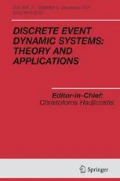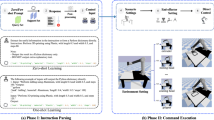Abstract
This paper presents an automaton-based task and motion planning framework for multi-robot systems (MRS) to satisfy finite words of linear temporal logic (LTL) task specifications in parallel and concurrently. A parallel decomposition algorithm is developed to iteratively decompose a global task specification into a set of smaller subtask automata. Robots are assigned to the smallest task component in each subtask automaton. The capability transition system of the assigned robots and these subtask automata synthesize a corresponding set of subtask planning automata (SPA), each of which is either an independent satisfaction of an individual subtask automaton or a concurrent satisfaction of multiple subtask automata. The overall robot assignments and SPA can guarantee the MRS to satisfy all the subtask automata. Each SPA can generate a minimal cost task plan by taking into account the costs of multi-robot tasking. The robots then plan motions to execute the tasks associated with the minimal cost task plans. The proposed framework is demonstrated with a multi-robot experiment for manufacturing tasks in a lab setting. Extensive numerical simulations are also performed to evaluate the scalability, computational complexity, and execution efficiency of the proposed framework and show its advantages over the centralized task and motion planning strategy.













Similar content being viewed by others
Code Availability
The source code of the framework and experiment is shown in the repository of the link https://github.com/huanfez/Parallel_Task_Decomposition_Planning
Notes
A co-safety LTL specification can be converted into a DFA by first using open source toolboxes “spot”: https://spot.lrde.epita.fr/app/ to derive a deterministic Büchi automaton (DBA) and further removing the suffix satisfying LTL for infinite times.
Note that we assume the optimal robot assignment is an effective assignment, which means the assignment can synthesize a non-empty SPA and provide a task planning solution. In the actual application, the system with a robot assignment may not output a viable task planning solution. We will not consider such an assignment as an effective one. More details can be found in the experiment section.
We perform the offline triangulation for the working environment with the package in the link: https://www.cs.cmu.edu/~quake/triangle.html
The robot assignments {r3}, {r4} output an empty task planning solution for subtask automaton G1. Hence, they will not be the effective assignments of subtask automaton G1.
References
Baier C, Katoen JP (2008) Principles of model checking. MIT Press, Cambridge
Banks C, Wilson S, Coogan S, Egerstedt M (2020) Multi-agent task allocation using cross-entropy temporal logic optimization. In: 2020 IEEE International Conference on Robotics and Automation (ICRA). IEEE, pp 7712–7718
Belta C, Bicchi A, Egerstedt M, Frazzoli E, Klavins E, Pappas GJ (2007) Symbolic planning and control of robot motion [grand challenges of robotics]. IEEE Robot Autom Mag 14(1):61–70
Chen Y, Ding XC, Belta C (2011) Synthesis of distributed control and communication schemes from global LTL specifications. In: Decision and Control and European Control Conference (CDC-ECC), 2011 50th IEEE Conference on. IEEE, pp 2718–2723
Chen Y, Ding XC, Stefanescu A, Belta C (2012) Formal approach to the deployment of distributed robotic teams. IEEE Trans Robot 28(1):158–171
Dai J, Benini A, Lin H, Antsaklis PJ, Rutherford MJ, Valavanis KP (2016) Learning-based formal synthesis of cooperative multi-agent systems with an application to robotic coordination. In: Control and Automation (MED), 2016 24th Mediterranean Conference on, IEEE, pp 1008–1013
Ding XC, Kloetzer M, Chen Y, Belta C (2011) Automatic deployment of robotic teams. IEEE Robotics & Automation Magazine 18(3):75–86
Faruq F, Parker D, Laccrda B, Hawes N (2018) Simultaneous task allocation and planning under uncertainty. In: 2018 IEEE/RSJ International Conference on Intelligent Robots and Systems (IROS). IEEE, pp 3559–3564
Fischer R, Plessow F (2015) Efficient multitasking: parallel versus serial processing of multiple tasks. Frontiers in Psychology 6:1366
Gerkey BP, Matarić MJ (2004) A formal analysis and taxonomy of task allocation in multi-robot systems. Int J Robot Res 23(9):939–954
Guo M, Dimarogonas DV (2015) Multi-agent plan reconfiguration under local LTL specifications. Int J Robot Res 34(2):218–235
Guo M, Dimarogonas DV (2017) Task and motion coordination for heterogeneous multi-agent systems with loosely coupled local tasks. IEEE Trans Autom Sci Eng 14(2):797–808
Henrich D, Honiger T (1997) Parallel processing approaches in robotics. In: ISIE’97 Proceeding of the IEEE international symposium on industrial electronics, vol 2. IEEE, pp 702–707
Kantaros Y, Zavlanos MM (2017) Sampling-based control synthesis for multi-robot systems under global temporal specifications. In: 2017 ACM/IEEE 8Th international conference on cyber-physical systems. IEEE, ICCPS, pp 3–14
Kantaros Y, Zavlanos MM (2020) Stylus*: a temporal logic optimal control synthesis algorithm for large-scale multi-robot systems. Int J Robot Res 39(7):812–836
Karaman S, Frazzoli E (2012) Sampling-based algorithms for optimal motion planning with deterministic μ-calculus specifications. In: 2012 American Control Conference (ACC). IEEE, pp 735–742
Karimadini M, Lin H (2011) Guaranteed global performance through local coordinations. Automatica 47(5):890–898
Korsah GA, Stentz A, Dias MB (2013) A comprehensive taxonomy for multi-robot task allocation. Int J Robot Res 32(12):1495–1512
Mahani MF, Wang Y (2018) Trust-based runtime verification for multi-quad-rotor motion planning with a human-in-the-loop. In: ASME 2018 Dynamic Systems and Control Conference, American Society of Mechanical Engineers Digital Collection
Saha I, Ramaithitima R, Kumar V, Pappas GJ, Seshia SA (2014) Automated composition of motion primitives for multi-robot systems from safe LTL specifications. In: Intelligent robots and systems (IROS 2014), 2014 IEEE/RSJ International Conference on. IEEE, pp 1525–1532
Schillinger P, Bürger M, Dimarogonas DV (2018a) Decomposition of finite LTL specifications for efficient multi-agent planning. In: Distributed Autonomous Robotic Systems, Springer, pp 253–267
Schillinger P, Bürger M, Dimarogonas DV (2018b) Simultaneous task allocation and planning for temporal logic goals in heterogeneous multi-robot systems. IntJ Robot Res 37(7):818–838
Shamgah L, Karimoddini A, Homaifar A (2016) A symbolic motion planning approach for the reach-avoid problem. In: 2016 IEEE International Conference on Systems, Man, and Cybernetics (SMC), IEEE, pp 003955–003960
Shiroma PM, Campos MF (2009) Comutar: A framework for multi-robot coordination and task allocation. In: 2009 IEEE/RSJ international conference on intelligent robots and systems, IEEE, pp 4817–4824
Tumova J, Dimarogonas DV (2015) Decomposition of multi-agent planning under distributed motion and task LTL specifications. In: Decision and Control (CDC), 2015 IEEE 54th Annual Conference on, IEEE, pp 7448–7453
Tumova J, Dimarogonas DV (2016) Multi-agent planning under local LTL specifications and event-based synchronization. Automatica 70:239–248
Ulusoy A, Smith SL, Ding XC, Belta C, Rus D (2013) Optimality and robustness in multi-robot path planning with temporal logic constraints. Int J Robot Res 32(8):889–911
Vasile CI, Belta C (2013) Sampling-based temporal logic path planning. In: 2013 IEEE/RSJ International Conference on Intelligent Robots and Systems, IEEE, pp 4817–4822
Wang Y, Humphrey LR, Liao Z, Zheng H (2018) Trust-based multi-robot symbolic motion planning with a human-in-the-loop. ACM Trans Interact Intell Syst (TiiS) 8(4):31
Zheng H, Wang Y (2019) A distributed framework for dynamic task allocation of multi-robot symbolic motion planning. In: 2019 American Control Conference (ACC). IEEE, pp 3291–3296
Zheng H, Liao Z, Wang Y (2018) Human-robot trust integrated task allocation and symbolic motion planning for heterogeneous multi-robot systems. In: ASME 2018 Dynamic Systems and Control Conference, American Society of Mechanical Engineers, pp V003T30A010–V003T30A010
Zlot RM, Stentz A (2006) An auction-based approach to complex task allocation for multirobot teams PhD thesis. Carnegie Mellon University, The Robotics Institute
Funding
This work was partially supported by the Air Force Office of Scientific Research (AFOSR) Young Investigator Research Program (YIP) under grant no. FA9550-17-1-0050.
Author information
Authors and Affiliations
Contributions
All authors contributed to the study conception and design. Material preparation, data collection and analysis were performed by Huanfei Zheng. The first draft of the manuscript was written by Huanfei Zheng and Yue Wang.
Corresponding author
Ethics declarations
Conflict of Interests
The authors declare that they have no conflict of interest.
Additional information
Publisher’s note
Springer Nature remains neutral with regard to jurisdictional claims in published maps and institutional affiliations.
This work was partially supported by the Air Force Office of Scientific Research (AFOSR) Young Investigator Research Program (YIP) under grant no. FA9550-17-1-0050.
Rights and permissions
About this article
Cite this article
Zheng, H., Wang, Y. Parallel decomposition and concurrent satisfaction for heterogeneous multi-robot task and motion planning under temporal logic specifications. Discrete Event Dyn Syst 32, 195–230 (2022). https://doi.org/10.1007/s10626-021-00355-z
Received:
Accepted:
Published:
Issue Date:
DOI: https://doi.org/10.1007/s10626-021-00355-z




